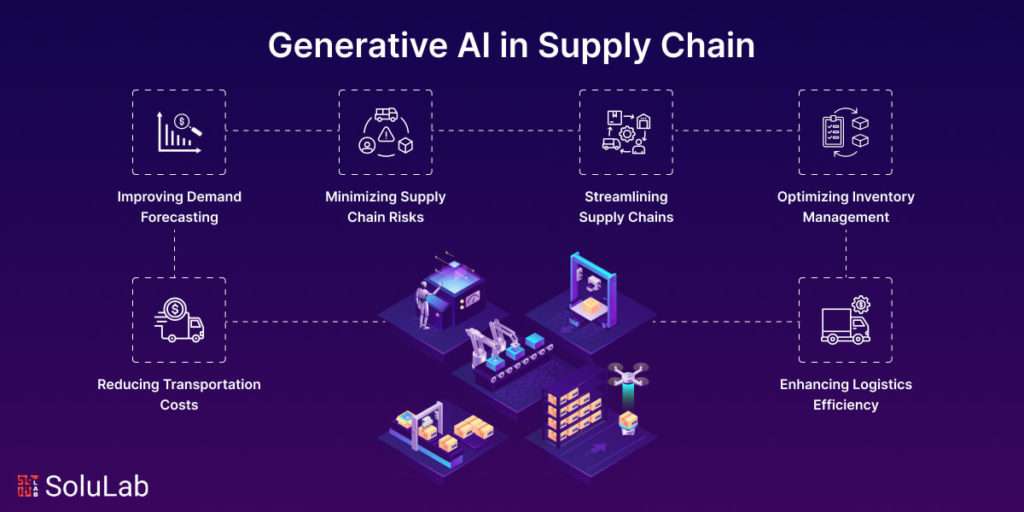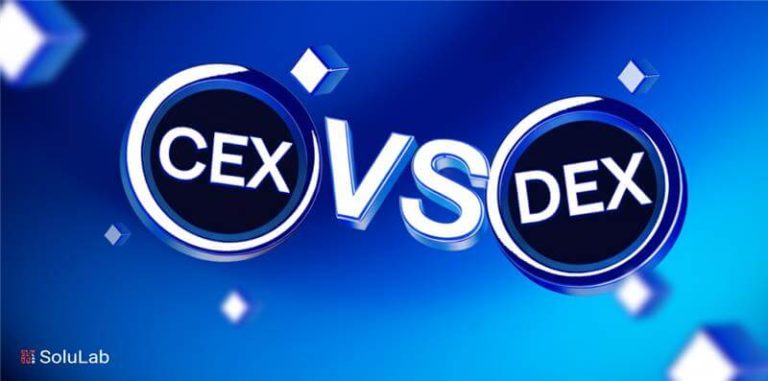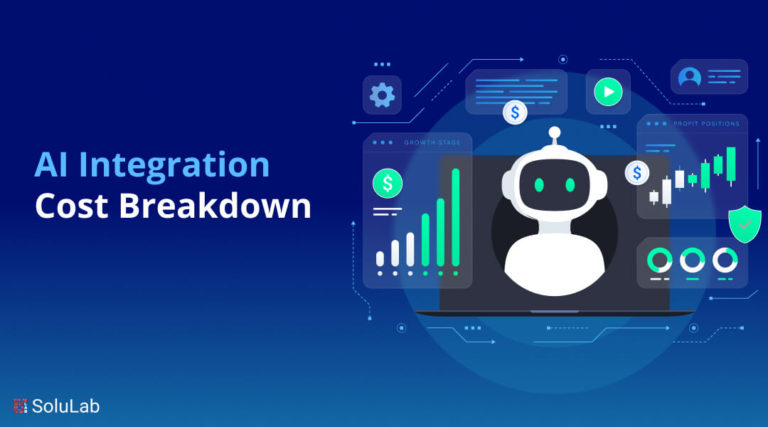
In 2023, the global artificial intelligence (AI) in the supply chain market was valued at an estimated USD 5.05 billion. It is anticipated to experience significant growth, with a projected compound annual growth rate (CAGR) of 38.9% from 2024 to 2030. This growth is driven by companies seeking creative solutions to optimize their supply chains and gain greater visibility into their operations. AI offers automation capabilities, enabling the analysis of vast data volumes and the generation of actionable insights. These insights can lead to improved efficiency, reduced costs, and enhanced transparency.
The supply chain is the backbone of any successful business, connecting suppliers, manufacturers, distributors, and customers in a vast, interconnected network. Efficiently managing this complex web is essential for minimizing costs, reducing delays, and meeting customer demand. However, traditional supply chain management is often hampered by unforeseen disruptions, inefficiencies, and a lack of real-time data. Enter Generative AI, a technology that uses machine learning models to optimize supply chain processes. By generating new solutions based on existing data, Generative AI in supply chain can transform how businesses manage their supply chains, ensuring greater agility, efficiency, and responsiveness to market changes.
In this blog, we will explore how Generative AI is changing supply chain management, the benefits it brings, the key areas it impacts, and its future potential.
Overview of Generative AI in Supply Chain Management
Generative AI has changed supply chain management, allowing businesses with unprecedented data-driven insights and optimization capabilities. Unlike traditional automation systems that operate within predefined parameters, Generative AI employs sophisticated algorithms to learn from vast amounts of data, identify patterns, and make predictions. This enables supply chain managers to make informed decisions, adapt to changing market conditions, and enhance overall operational efficiency. At the core of Generative AI’s transformative potential lies its ability to simulate various supply chain scenarios and predict future trends.
By using historical data, real-time information, and external factors, Generative models can create realistic simulations that mimic the complexities of the supply chain. This allows businesses to test different strategies, evaluate potential risks, and optimize their operations before implementing changes in the real world. One of the key areas where Generative AI excels is inventory management. By analyzing demand patterns, supplier lead times, and inventory holding costs, Generative models can determine optimal inventory levels for each item, minimizing the risk of stockouts while reducing inventory carrying costs. This data-driven approach helps businesses strike a delicate balance between customer service levels and operational efficiency.
Key Areas Where Generative AI Impacts Supply Chain
Generative AI is making a significant impact across multiple aspects of supply chain management. Here’s an overview of the key areas where this technology is upgrading operations:
- Demand Forecasting: Generative AI revolutionizes demand forecasting by leveraging historical sales data, market trends, economic indicators, social media sentiment, and even weather patterns to deliver highly accurate predictions of customer demand. This allows businesses to optimize production schedules, allocate resources efficiently, and avoid costly overproduction or stock shortages. For instance, a fashion retailer can use Generative AI to forecast demand for specific clothing items based on seasonal trends, weather patterns, celebrity endorsements, and even social media buzz, ensuring that they have the right products in stock at the right time.
- Inventory Optimization: AI algorithms continuously monitor stock levels, sales patterns, lead times, and supplier performance to optimize inventory management. This helps businesses maintain optimal stock levels, reduce carrying costs, prevent stockouts, and free up cash flow. For example, an e-commerce company can use Generative AI to identify slow-moving items, adjust inventory levels accordingly, and allocate resources to faster-selling products.
- Supply Chain Risk Management: Generative AI analyzes geopolitical risks, global events, market volatility, and historical trends to identify potential disruptions in the supply chain. This enables businesses to develop proactive mitigation strategies, such as diversifying suppliers, establishing backup transportation routes, and maintaining safety stocks. For instance, a manufacturing company can use Generative AI to assess the impact of a natural disaster on its supply chain and develop contingency plans to minimize disruptions, ensuring uninterrupted production and customer satisfaction. By exploring Generative AI use cases in supply chain, organizations can gain insights that enhance their resilience and adaptability in the face of unforeseen challenges.
- Route Optimization: AI-driven tools analyze data such as traffic patterns, fuel prices, delivery schedules, and customer locations to optimize transportation routes. This helps businesses reduce fuel consumption, minimize delivery times, and improve overall efficiency. For example, a logistics company can use Generative AI to optimize delivery routes for its fleet of trucks, considering factors such as traffic congestion, road conditions, and customer preferences, resulting in faster deliveries and reduced operating costs.
- Supplier Relationship Management: Generative AI enhances supplier collaboration by analyzing performance data, identifying potential risks, and providing predictive insights about supplier capabilities. This helps businesses make informed decisions about supplier selection, contract negotiation, and inventory management. For example, a retail chain can use Generative AI to evaluate the reliability, quality, and cost-effectiveness of its suppliers, enabling better decision-making and improved supplier relationships, ultimately leading to a more resilient and efficient supply chain.
Benefits of Using Generative AI in Supply Chain Management
Incorporating Generative AI into supply chain management provides a range of tangible benefits for businesses. From streamlining operations to cutting costs, the advantages of using this technology are vast. Here’s a deeper dive into some of the most impactful benefits:
1. Enhanced Decision-Making: With Generative AI, businesses can make faster and more accurate decisions thanks to real-time data and advanced analytics. This enables them to respond quickly to market changes, shorten lead times, optimize operations, and gain an advantage. For example, Generative AI in supply chain management can power demand forecasting that anticipates shifts in customer behavior, leading to more efficient production planning and inventory management. Additionally, Generative AI can help businesses identify new opportunities for growth and innovation by analyzing large amounts of data and generating creative solutions.
2. Cost Reduction: Generative AI helps businesses minimize waste and overstocking through optimized inventory management. Automated decision-making processes further contribute to cost reduction by eliminating manual errors and streamlining workflows. AI also provides insights into supplier negotiations, enabling businesses to secure better deals and terms. For instance, Generative AI can analyze historical data and market trends to identify potential cost-saving opportunities. It can also automate the process of negotiating with suppliers, ensuring that businesses get the best possible prices and terms.
3. Increased Efficiency: Generative AI streamlines supply chain operations by automating repetitive tasks such as order processing, inventory tracking, and transportation scheduling. This improves operational efficiency, reduces manual labor costs, and minimizes the risk of human error. By optimizing logistics and production cycles, AI also enhances productivity and reduces downtime. For example, Generative AI can create digital twins of supply chain networks to simulate different scenarios and identify potential bottlenecks. It can also use machine learning algorithms to optimize inventory levels and reduce the risk of stockouts.
4. Risk Mitigation: AI-powered risk assessments enable businesses to proactively identify and mitigate potential disruptions in their supply chain. Generative AI can simulate various scenarios, such as natural disasters, supplier delays, and economic downturns, to help companies develop contingency plans. This proactive approach minimizes the impact of unexpected events and ensures business continuity. For instance, Generative AI can use historical data and real-time information to identify potential disruptions in the supply chain. It can then generate recommendations for mitigating these risks, such as diversifying suppliers or implementing inventory buffers.
5. Improved Scalability: As businesses grow, their supply chains become more complex, requiring scalable solutions to manage the increased data loads and operational complexity. Generative AI provides flexible and scalable solutions that can adapt to changing business needs. This ensures that supply chain operations can continue to function efficiently even as the business expands. For example, Generative AI can use distributed computing architectures to handle large amounts of data and complex calculations. It can also use machine learning algorithms to adapt to changing business conditions and identify new opportunities for improvement.
Applications of Generative AI in Supply Chain Management
Generative AI offers various applications that can enhance supply chain management by improving processes, boosting efficiency, and ensuring smooth operations. Below are the top areas where Generative AI is most commonly applied:
1. Demand Forecasting
Generative AI’s ability to process and analyze vast amounts of data makes it ideal for demand forecasting. By evaluating historical sales trends, market conditions, and even factors such as seasonality or economic shifts, AI models predict future demand with a high degree of accuracy. This allows businesses to better align production schedules, avoid excess inventory, and reduce the risk of stockouts. For example, a global retailer can use Generative AI inventory management to forecast customer demand for holiday shopping, adjusting its stock levels accordingly to ensure that popular items are readily available while minimizing waste from overproduction. Additionally, AI can identify emerging trends and changing consumer preferences, enabling businesses to adapt their product offerings and marketing strategies accordingly.
2. Inventory Optimization
Inventory management is a critical aspect of supply chain efficiency, and Generative AI helps optimize stock levels in real time. AI models evaluate current inventory, sales data, and supplier lead times to suggest optimal inventory levels that balance cost and availability. This ensures that companies maintain the right amount of stock at the right time, reducing holding costs while preventing shortages.
For instance, an electronics manufacturer could use AI-driven inventory systems to predict the precise quantity of components required for production, ensuring that supply meets demand without holding excess stock. AI can also analyze inventory turnover rates, identify slow-moving items, and recommend strategies for reducing obsolete inventory.
3. Supply Chain Risk Management
Supply chains are inherently vulnerable to disruptions—whether from natural disasters, geopolitical tensions, or supplier issues. Generative AI plays a key role in identifying and managing these risks by analyzing global events, market fluctuations, and historical data. AI models can predict potential disruptions and help businesses develop mitigation strategies, ensuring smoother operations even during uncertain times.
For example, a logistics company could use Generative AI to anticipate potential delays due to weather conditions, allowing it to reroute shipments and avoid disruptions. Additionally, AI can monitor supplier performance, identify potential risks, and recommend alternative suppliers to ensure continuity of supply.
4. Route Optimization
Efficient logistics and transportation are essential for maintaining a cost-effective supply chain. Generative AI can analyze traffic patterns, fuel costs, and other logistical factors to determine the most efficient routes for deliveries. This not only reduces fuel consumption and transportation costs but also improves delivery times. For instance, a delivery service could use AI and supply chain management to implement AI-generated route optimizations, ensuring faster deliveries during peak traffic hours and leading to better customer satisfaction. AI can also analyze historical delivery data to identify areas with high demand and optimize routes accordingly.
5. Supplier Relationship Management
Managing suppliers effectively is critical for a smooth supply chain. Generative AI can analyze supplier performance, assess risks, and provide insights that enable better decision-making regarding supplier contracts and relationships. This helps businesses ensure timely deliveries, maintain quality standards, and reduce supplier-related disruptions.
For example, a manufacturing company might use Generative AI to monitor the performance of its raw material suppliers, flagging any potential risks and suggesting alternative suppliers when necessary.
Examples of Generative AI in supply chain
Several companies are already harnessing the power of Generative AI to optimize their supply chain operations. Here are a few real-world examples:
- Amazon: As the world’s largest e-commerce company, Amazon utilizes Generative AI to optimize its logistics network and enhance customer satisfaction. Generative AI in supply chain helps Amazon forecast demand, manage inventory levels, and optimize delivery routes accurately. This allows Amazon to ensure timely deliveries even during peak shopping periods, such as the holiday season. Generative AI in supply chain‘s data analysis capabilities enables Amazon to make informed decisions about product allocation, inventory replenishment, and delivery schedules based on historical sales records, customer preferences, and real-time market trends. By leveraging AI, Amazon can minimize waste, reduce operational costs, and improve overall efficiency, providing customers with a seamless and convenient shopping experience.
- Walmart: Walmart, a retail giant, uses AI-driven forecasting tools to predict demand and manage inventory effectively. By integrating AI into its supply chain operations, Walmart can ensure that products are always available on shelves when customers need them without overstocking. AI-powered forecasting models analyze historical sales data, weather patterns, economic indicators, and social media trends to identify demand patterns and anticipate future customer needs. This enables Walmart to optimize its inventory levels, reduce the risk of stockouts, and minimize waste. Additionally, AI helps Walmart identify emerging trends, seasonal variations, and regional preferences, allowing the company to tailor its product offerings and promotions accordingly.
- DHL: DHL, a leading global logistics company, harnesses the power of Generative AI in supply chain to revolutionize its global supply chain network. Generative AI models optimize route planning, identify potential risks, and forecast demand accurately. By utilizing Generative AI , DHL can create highly efficient and cost-effective delivery routes, considering factors such as traffic patterns, weather conditions, and geopolitical risks. Generative AI also assigns DHL to develop proactive risk management strategies, enabling the company to identify and mitigate potential disruptions, such as natural disasters or political unrest, that could impact the delivery process. Furthermore, Generative AI in supply chain helps DHL forecast demand more accurately, ensuring that it has the necessary resources and capacity to meet customer needs. By leveraging AI, DHL can enhance its operational efficiency, reduce transit times, and provide customers with reliable and timely deliveries.
Challenges and Limitations of Generative AI in Supply Chain
While Generative AI offers immense potential for supply chain optimization, it is not without its challenges. Some of the most significant limitations include:
1. Data Quality:
Generative AI’s effectiveness is heavily influenced by the quality of the data it’s trained on. Inaccurate or incomplete data can lead to biased or erroneous predictions, resulting in suboptimal decision-making. Ensuring data accuracy and completeness requires careful data cleansing processes to remove duplicate, inconsistent, or missing values. Additionally, implementing AI-driven supply chain visibility requires data validation, which involves verifying the accuracy and integrity of the data through techniques such as data profiling, range checks, and outlier detection. Data curation involves organizing, structuring, and annotating the data to make it suitable for Generative AI training. These processes can be time-consuming and resource-intensive, requiring skilled data engineers and data scientists.
2. High Implementation Costs:
Implementing AI-driven systems in the supply chain requires significant upfront investments in technology, infrastructure, and skilled personnel. Acquiring and setting up the necessary hardware, such as high-performance computing servers and GPUs, can be a substantial cost. Software costs include licensing fees for AI platforms and tools, as well as custom development expenses for integrating AI into existing systems. Network infrastructure upgrades may be necessary to handle the increased data volume and computational demands of AI applications. Moreover, organizations focusing on Generative AI in supply chain planning need to invest in training and upskilling their workforce to operate and maintain these systems effectively, which can involve hiring specialized AI engineers and data scientists.
3. Integration Complexity:
Integrating Generative AI in the supply chain into existing supply chain systems can be a complex and challenging task. It often involves restructuring current operations, workflows, and processes to fully leverage AI’s potential. This can be particularly challenging for organizations with legacy systems and processes that are not easily adaptable to AI integration. The complexity of integration can further increase as the number and variety of AI-driven applications grow within the supply chain. Organizations may need to work with external consultants or system integrators to ensure a smooth and successful integration process, especially when implementing Generative AI in the supply chain solutions.
4. Ethical and Privacy Concerns
The increasing use of AI-driven decision-making in the supply chain raises ethical concerns related to job displacement and data privacy. As Generative AI supply chain-powered systems automate tasks and processes, there’s a risk of job losses and displacement of workers, particularly in repetitive and routine functions. Addressing these concerns requires careful consideration of the social and economic implications of AI implementation, including providing opportunities for reskilling and upskilling workers. The use of AI algorithms for decision-making can raise data privacy issues, as organizations need to ensure that sensitive information, such as customer data or supplier information, is handled responsibly and in compliance with privacy regulations. Organizations should establish clear policies and procedures to protect data privacy and ensure that Generative AI supply chain systems are used ethically and responsibly.
Future of Generative AI in Supply Chain Management
The future of Generative AI in supply chain management holds immense promise, with the potential to revolutionize how businesses plan, manage, and execute their supply chain operations. As the technology evolves, it will become more accessible, scalable, and integral to business operations. AI-driven supply chains will be able to leverage real-time data and analytics to anticipate market changes, identify potential disruptions, and adapt their strategies accordingly. This agility will enable businesses to respond quickly to unexpected events, such as natural disasters or geopolitical shifts, minimizing the impact on their operations. The continued advancements in AI technology promise to further enhance the capabilities of Generative AI applications in supply chain management. As AI algorithms become more sophisticated and data collection methods improve, Generative AI will be able to provide even more accurate and actionable insights. This will enable businesses to make more informed decisions, leading to increased supply chain efficiency, resilience, and sustainability.
Conclusion
In conclusion, Generative AI is transforming supply chain management by enhancing operational efficiency, improving inventory management, and providing real-time insights. Companies that assume these advanced technologies are better positioned to optimize their logistics operations, meet customer demands, and stay in a growing market.
A prime example of this transformation is Locus, a leader in AI-powered logistics solutions for small and medium-sized businesses in India. Recognizing the need for enhanced operational efficiency, Locus partnered with a Generative AI Development Company to implement several innovative solutions. By integrating Generative AI into their platform, they achieved significant improvements. Their AI-powered route optimization reduced delivery times by 20%, while automated decision-making processes enhanced operational efficiency by 15%. Furthermore, real-time shipment tracking increased customer satisfaction ratings by 25%, demonstrating the tangible benefits of adopting Generative AI.
For businesses looking to harness the power of Generative AI, partnering with a Gen AI Consulting Company provider can make all the difference. If you’re considering enhancing your supply chain operations, don’t hesitate to hire gen AI developers who can tailor solutions to your specific needs. Together, we can navigate the complexities of the supply chain and unlock new levels of efficiency and success.
FAQs
1. What is Generative AI in supply chain management?
Generative AI in supply chain management refers to using advanced AI technologies to enhance operational efficiency, optimize logistics, and improve decision-making processes. It can automate routine tasks and provide valuable insights into the supply chain.
2. How can a Gen AI Development Company help improve supply chain operations?
Top Gen AI Development Company can offer designed solutions to integrate Generative AI into your supply chain processes, enabling better forecasting, inventory management, and visibility. Their expertise can help streamline operations and reduce costs.
3. What are some real-world applications of Generative AI in the supply chain?
Real-world applications include Generative AI inventory management, logistics optimization, and supply chain forecasting. These applications enhance decision-making and operational efficiency, leading to improved customer satisfaction.
4. How do I choose the right Gen AI Development Services for my supply chain needs?
When selecting Gen AI Development Services, consider their expertise in supply chain optimization, previous project success stories, and ability to customize solutions to your specific requirements.
5. Why should I hire an AI developer for my supply chain project?
Hiring an AI developer can provide you with the technical skills needed to implement Generative AI solutions effectively. They can help design, develop, and deploy AI models tailored to your supply chain needs, ensuring seamless integration and functionality.
6. How does Generative AI logistics management improve supply chain performance?
Generative AI logistics management enhances supply chain performance by analyzing vast amounts of data to optimize routes, reduce transportation costs, and improve delivery times.






